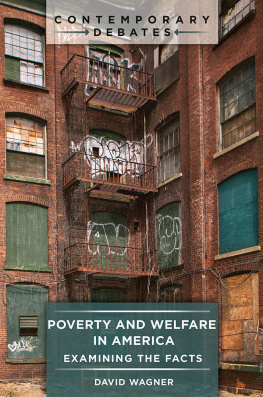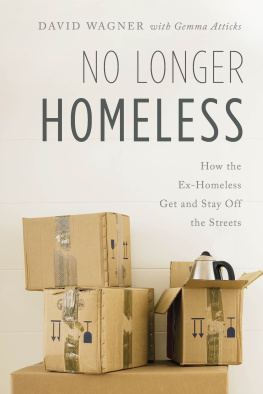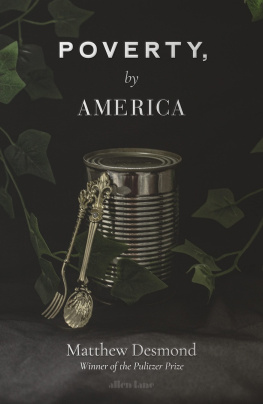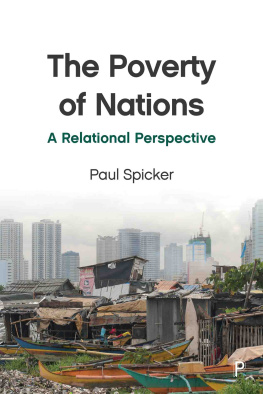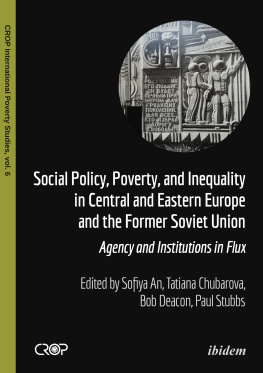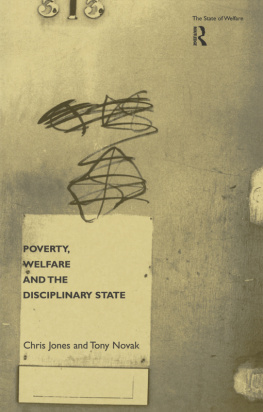Poverty and Welfare in America
Recent Titles in Contemporary Debates
The Affordable Care Act: Examining the Facts
Purva H. Rawal
Climate Change: Examining the Facts
Daniel Bedford and John Cook
Immigration: Examining the Facts
Cari Lee Skogberg Eastman
Marijuana: Examining the Facts
Karen T. Van Gundy and Michael S. Staunton
Muslims in America: Examining the Facts
Craig Considine
Prisons and Punishment in America: Examining the Facts
Michael OHear
American Journalism and Fake News: Examining the Facts
Seth Ashley, Jessica Roberts, and Adam Maksl
Free Speech and Censorship: Examining the Facts
H. L. Pohlman
P OVERTY AND
W ELFARE IN
A MERICA

Examining the Facts
David Wagner
Contemporary Debates

Copyright 2019 by ABC-CLIO, LLC
All rights reserved. No part of this publication may be reproduced, stored in a retrieval system, or transmitted, in any form or by any means, electronic, mechanical, photocopying, recording, or otherwise, except for the inclusion of brief quotations in a review, without prior permission in writing from the publisher.
Library of Congress Cataloging-in-Publication Data
Names: Wagner, David, author.
Title: Poverty and welfare in America : examining the facts / David Wagner.
Description: Santa Barbara, CA : ABC-CLIO, [2019] | Series: Contemporary debates | Includes bibliographical references and index.
Identifiers: LCCN 2019017841 (print) | LCCN 2019021646 (ebook) | ISBN 9781440856457 (ebook) | ISBN 9781440856440 (alk. paper)
Subjects: LCSH: PovertyUnited States. | United StatesSocial policy. | PoorUnited StatesSocial conditions. | Public welfareUnited States.
Classification: LCC HC110.P6 (ebook) | LCC HC110.P6 W226 2019 (print) | DDC 362.5/560973dc23
LC record available at https://lccn.loc.gov/2019017841
ISBN: 978-1-4408-5644-0 (print)
978-1-4408-5645-7 (ebook)
23 22 21 20 19 1 2 3 4 5
This book is also available as an eBook.
ABC-CLIO
An Imprint of ABC-CLIO, LLC
ABC-CLIO, LLC
147 Castilian Drive
Santa Barbara, California 93117
www.abc-clio.com
This book is printed on acid-free paper 
Manufactured in the United States of America

Contents

How to Use This Book
Poverty and Welfare in America: Examining the Facts is the next volume in ABC-CLIOs new Contemporary Debates reference series. Each title in this series, which is intended for use by high school and undergraduate students as well as members of the general public, examines the veracity of controversial claims or beliefs surrounding a major political/cultural issue in the United States. The purpose of the series is to give readers a clear and unbiased understanding of current issues by informing them about falsehoods, half-truths, and misconceptionsand confirming the factual validity of other assertionsthat have gained traction in Americas political and cultural discourse. Ultimately, this series has been crafted to give readers the tools for a fuller understanding of controversial issues, policies, and laws that occupy center stage in American life and politics.
Each volume in this series identifies 3040 questions swirling about the larger topic under discussion. These questions are examined in individualized entries, which are in turn arranged in broad subject chapters that cover certain aspects of the issue being examined, that is, history of concern about the issue, potential economic or social impact, findings of latest scholarly research, and so on.
Each chapter features approximately 410 individual entries. Each entry begins by stating an important and/or well-known Question about the issue being studiedfor example, Have poverty levels risen in recent decades in the United States?, Have scientists established a link between severe weather events and climate change?
The entry then provides a concise and objective one- or two-paragraph Answer to the featured question, followed by a more comprehensive, detailed explanation of The Facts. This latter portion of each entry uses quantifiable, evidence-based information from respected sources to fully address each question and provide readers with the information they need to be informed citizens. Importantly, entries will also acknowledge instances in which conflicting data exists or data is incomplete. Finally, each entry concludes with a Further Reading section providing users with information on other important and/or influential resources.
The ultimate purpose of every book in the Contemporary Debates series is to reject false equivalence, in which demonstrably false beliefs or statements are given the same exposure and credence as the facts; to puncture myths that diminish our understanding of important policies and positions; to provide needed context for misleading statements and claims; and to confirm the factual accuracy of other assertions. In other words, volumes in this series are being crafted to clear the air surrounding some of the most contentious and misunderstood issues of our timenot just add another layer of obfuscation and uncertainty to the debate.

Introduction
While hopefully readers will embrace a humanitarian concern with poverty, self-interest is also a key a reason to be concerned about poverty. Society gains from the alleviation of poverty and so do people of all classes, notably the middle class. Also, since many people experience poverty during their lives, many of us may be among them.
Poverty often leads to hunger and sometimes starvation, to disease and illness. It leads often to less education, poorer medical care, a shorter life span, worse mental health, and many other negative outcomes. We are moved by seeing a homeless couple sleeping on the street, by the commercials of children in misery in poor countries, and by pictures of long lines at the neighborhood soup kitchen. But being a humanitarian is only one reason to be concerned with poverty. A large number of people in our society will pass through poverty at some point in life whether as children (the group most in poverty in the United States), as adults, or as elderly people (historically the age group most in poverty until quite recently). Mark Rank (2005, p. 63) reports that eventually (by age 75) a majority of Americans will have spent at least one year in poverty. During the Great Depression, a large percentage of Americans were poor, and the last recession of 20082009 produced many millions of newly poor people. Self-interest dictates that we be concerned as any of us (and our parents, grandparents, and children) may become poor for a wide variety of reasons including recessions and depressions, disabilities, medical crises, personal crises like divorce or domestic violence, old age, and other issues. Also, although many may disdain poor people, better conditions for the poorest people benefit those economically above them: the higher the lowest wages, the more pressure to raise wages for those above that level, for example. Many people are not concerned about pensions for the elderly, disability assistance, or government medical care, only to be angry when they need these benefits for themselves or their family and are denied them or told how low the benefits are. Many middle-class people are stunned by the paltry nature of our social programs when they suddenly need them.
Next page
